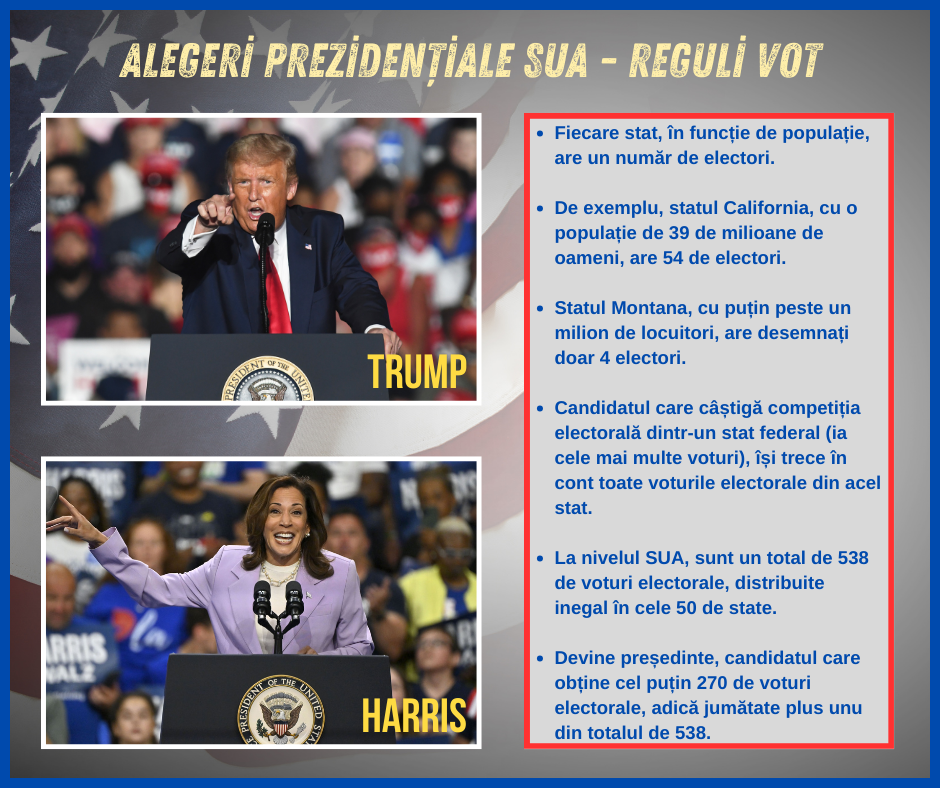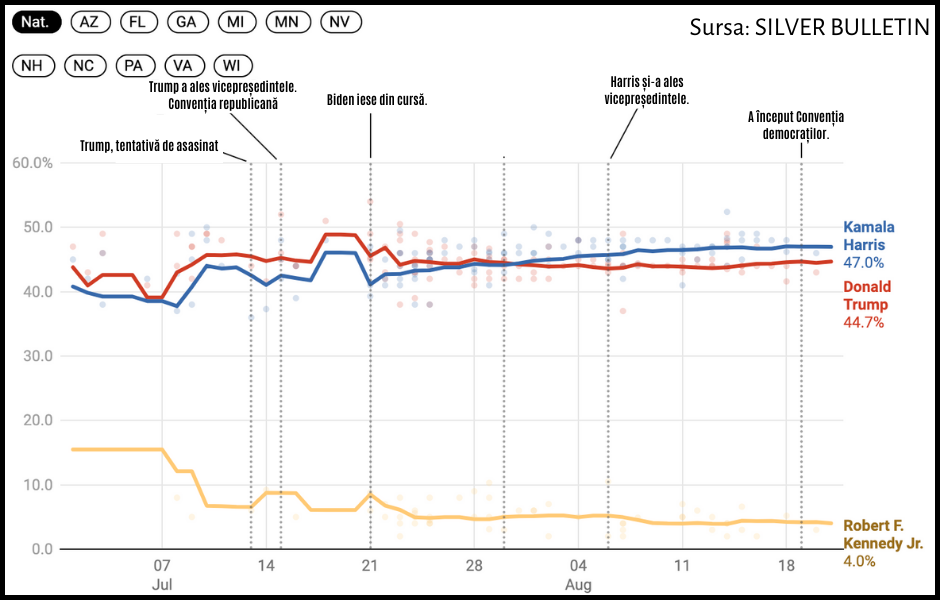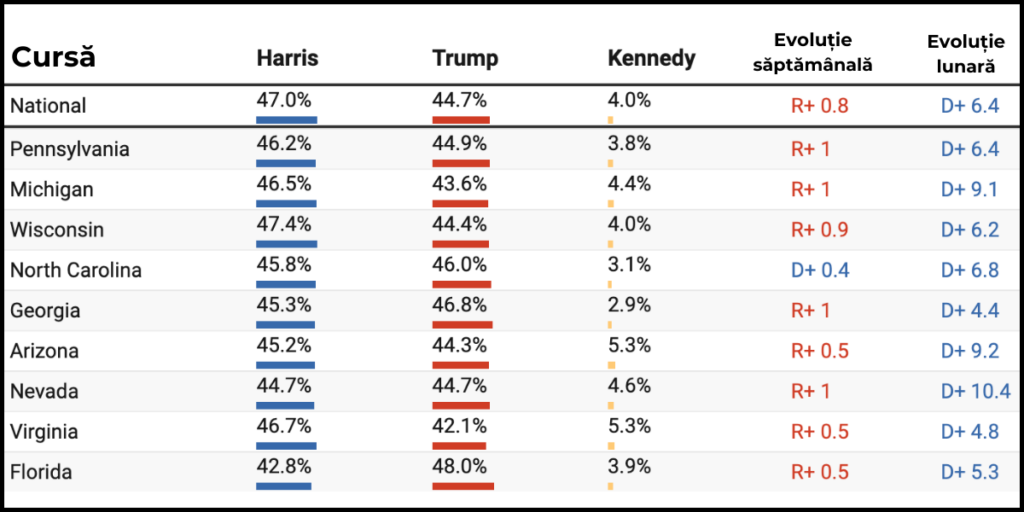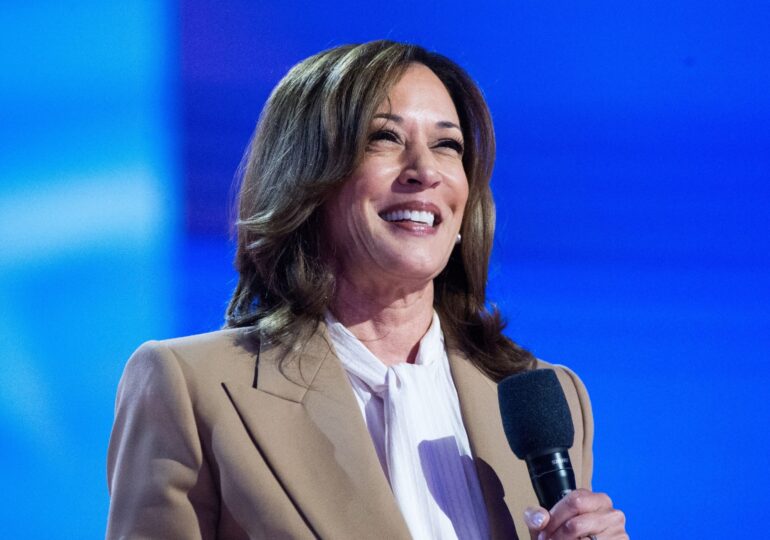Kamala Harris was officially nominated as a candidate for the US presidency by delegates attending the Democratic Convention. She did not participate in the internal elections, easily won by Joe Biden, the incumbent president, her position being forcibly obtained through a maneuver by party leaders.
Kamala Harris replaced the current US leader on July 21, when Biden announced he no longer intended to seek a second term.
From the position of vice president, she was the most well-known representative of the American Democrats, holding the most important political position, and thus, her entry into the race for the White House happened quickly and without visible confrontations within the party.
For Joe Biden, however, it was a tough blow, but he had no arguments to continue after the disastrous debate with Trump at the end of June and poor numbers in opinion polls.
For a good part of American society, Donald Trump's return to the White House represents a danger for the USA.
This led to a unity of the most influential Democrats who managed to force Joe Biden's withdrawal. We're talking about the Obama family, the Clinton family, and Nancy Pelosi, former leader of the Democrats in the House of Representatives.

Enthusiasm Begins to Wane
Pelosi stated she will do everything possible to prevent Donald Trump from ever reaching the White House, taking a major political risk by removing Joe Biden.
In this context, Kamala Harris faces a very tough mission. The enthusiasm for changing the Democratic candidate, whom most Americans saw as too old to serve a second term, has begun to fade.
The Democratic Convention concluded with the nominee's speech, and in the next 70 days, a tough, intense, and exhausting political confrontation will follow, where both sides will use all resources to defeat their opponent.
Kamala Harris has become the favorite to win the US presidency, according to polls, but the difference from Donald Trump is small, within the margin of error of sociological studies.
On September 10, the first televised debate between the two candidates will take place, and then it will become much clearer in which direction the balance of power is leaning.

Lost One Point in the Last Week
Harris has developed a strong electoral campaign. She covers key states with events and speeches, where the two candidates are practically equal.
Her main objective is to win elections in Wisconsin, Michigan, Pennsylvania, and Virginia, where the score is tight, but she already has a slight advantage over Trump, which doesn't mean much when there are over two months until election day.
A state leans towards one candidate or another if, in several consecutive polls, the difference is over 5 percent. Only then can a clear favorite be mentioned.
With 70 days before the elections, Kamala Harris has a 53% chance of winning the presidential elections, while Donald Trump has 47%, according to the projection made by Silver Bulletin.
According to the same projection, in the course of a week, Kamala Harris lost one percentage point in her chances of victory, dropping from 54 to 53%, indicating that the enthusiasm has begun to wane, and something else is needed in the campaign.

Obstacle for Donald Trump
Kamala Harris has a strategic advantage over Trump, linked to the fact that she has personalities like Barack Obama, Michelle Obama, Hillary Clinton, Oprah Winfrey on her side, who support her, travel to key states, give speeches, participate in debates, and can convince undecided voters to vote for her.
Donald Trump relies solely on the strength of his personality. His aggressive style has even alienated those who were part of the government when he was president.
In the Republican Party, the moderate wing, led by Nikki Haley, even though it has shown support for his candidacy, does not campaign for Donald Trump.
In this context, the Republican candidate has a strategic problem in terms of conveying political messages to voters.
The obstacle was indirectly confirmed by Donald Trump, who two weeks ago changed his campaign strategy, focusing on press conferences broadcast on television channels and social networks, as well as creating strong media events, such as the "discussion" with Elon Musk on X, formerly Twitter.
The change yielded results, halting the decline in polls, but there are still many question marks as to whether the former president will be able to keep up with Kamala Harris's pace.
A Journey Full of Surprises
The Democratic Party nominee, on the other hand, has $500 million at her disposal to win the elections and shows that she is not willing to believe she has won before the votes are counted, a trap Hillary Clinton fell into in 2016.
"We are a polarized nation in a difficult period, and despite everything happening in this country, Donald Trump enjoys the greatest support of all time. It will all come down to the fight to win vote by vote," stated Jen O’Malley Dillon, Kamala Harris's campaign manager, as quoted by Politico.
Despite the optimism shown by delegates at the Democratic Convention and the confidence conveyed by the nominated candidate for the White House, the confrontation with Trump is a long, complicated, and full of surprises journey.

